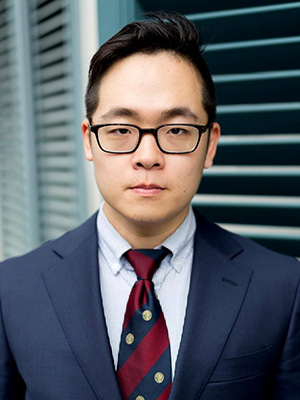Andrew Chung
Music History/Theory/Ethnomusicology, Music Theory
Associate Professor of Music Theory
1002

Andrew Chung serves as associate professor of music theory at the University of North Texas whose scholarly work specializes in the history and theoretical analysis of 20th and 21st-century European and American art music in experimental and avant-garde traditions. Dr. Chung has strong interdisciplinary interests ranging between music theory and historical musicology, further encompassing continental philosophy (especially the philosophy of language), linguistic anthropology and sound studies. His publications appear in the Journal of the American musicological society, Music Theory Spectrum, Resonance: A Journal of Sound and Culture, Sound Studies, and Music Theory Online. His 2019 article, “What is Musical Meaning? Towards a Theory of Music as Performative Utterance” in Music Theory Online vol. 25, no. 1 was a winner of the Society for Music Theory’s Emerging Scholar Award in 2022.
He is currently drafting the manuscript of a book project called Music’s Long Anthropocene: Colonial Modernity’s Musics as the Sonic Traces of Climatic Imperilment. This monograph journeys through a selective but illustrative history of music's disclosures of an earth transformed by empire: wending a path through representations of the Americans on the early modern European musical stage, Indigenous American songs attesting to the lethality and ecological toll of colonization, antebellum slave work songs in their articulation to the transformation of terrestrial soil engendered by the plantation, and experimental musics reflecting the recognition of coloniality's earthly consequences. This project centralizes the rise of coloniality and the humanisms of global modernity within the origin story of the Anthropocene to theorize a historiography and ethics of music for this geological epoch. As such, this project explores how musical and sonic artworks both demand and proffer ethico-political frameworks that can adequately address how race and difference are imbricated within the differentially, unequally distributed effects of our warming planet. This work seeks to dignify theory, philosophy, and interdisciplinary understandings not as alternatives to musical analysis, but as the very means of musical analysis and musical theorizing.
Dr. Chung’s interests also extend to the history of music theory, especially in the early modern Atlantic World. This work examines categories like consonance, harmony, and keyboard temperament and how the musical thinking of the 16th to 18th centuries regarding these parameters interacted with the ideologies and justificatory apparatuses of New World colonization. As discourses on tuning moved from speculative canonics on the monochord to the early modern emergence of temperament science on the keyboard, tuning transformed from a project of discerning the logics of God’s harmonically perfect cosmos to a project of improving, technically and technologically manipulating, and utilizing the materialities of the sublunary world. My work argues that discourses on keyboard temperaments developed new understandings of musically-usable tonal spaces as spaces in dialogue with rapidly changing theological, economic, and legal understandings of literal Earthly spaces in European thought as it sought to cope with, control, and profit from the expanding planet disclosed in the colonial project. This work examines how European theorists’ language and logics for discussing tuning and temperament were shaped by the kinds of economic, ecological, theological, jurisprudential, and natural-philosophical rationalities naturalized in the colonial project. On the other side of the Atlantic, documentation of the New World attests that Europeans’ perceptions of dissonance and mistuning were rationalized as “justifications” for imperial invasions, alongside the use of tuning and consonance as metaphors for imposing harmonious colonial administration over the colonies and their subjects.
Dr. Chung earned a BA in music and neuroscience & behavior from Wesleyan University, and an MA in music, MPhil in music, and PhD in music from Yale University.